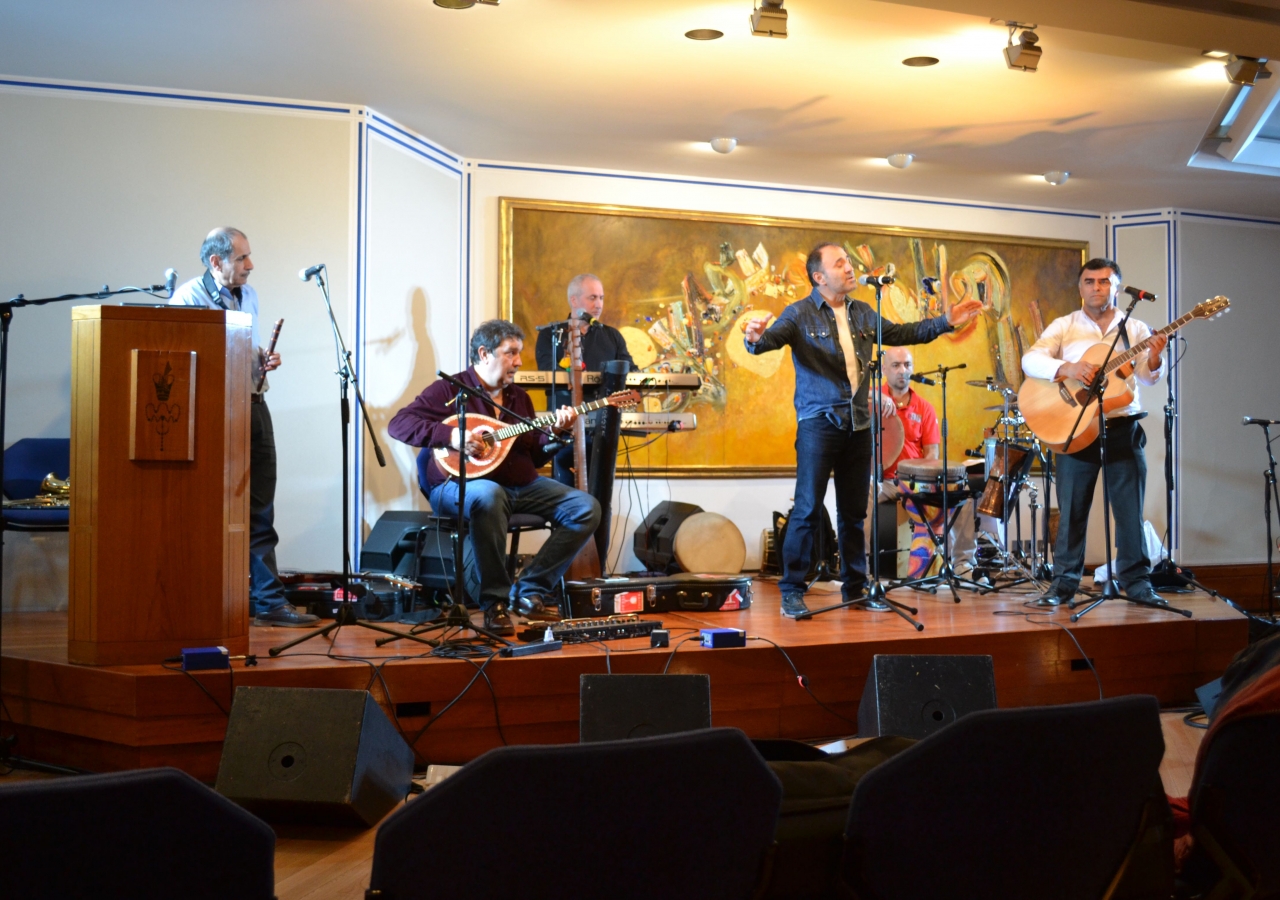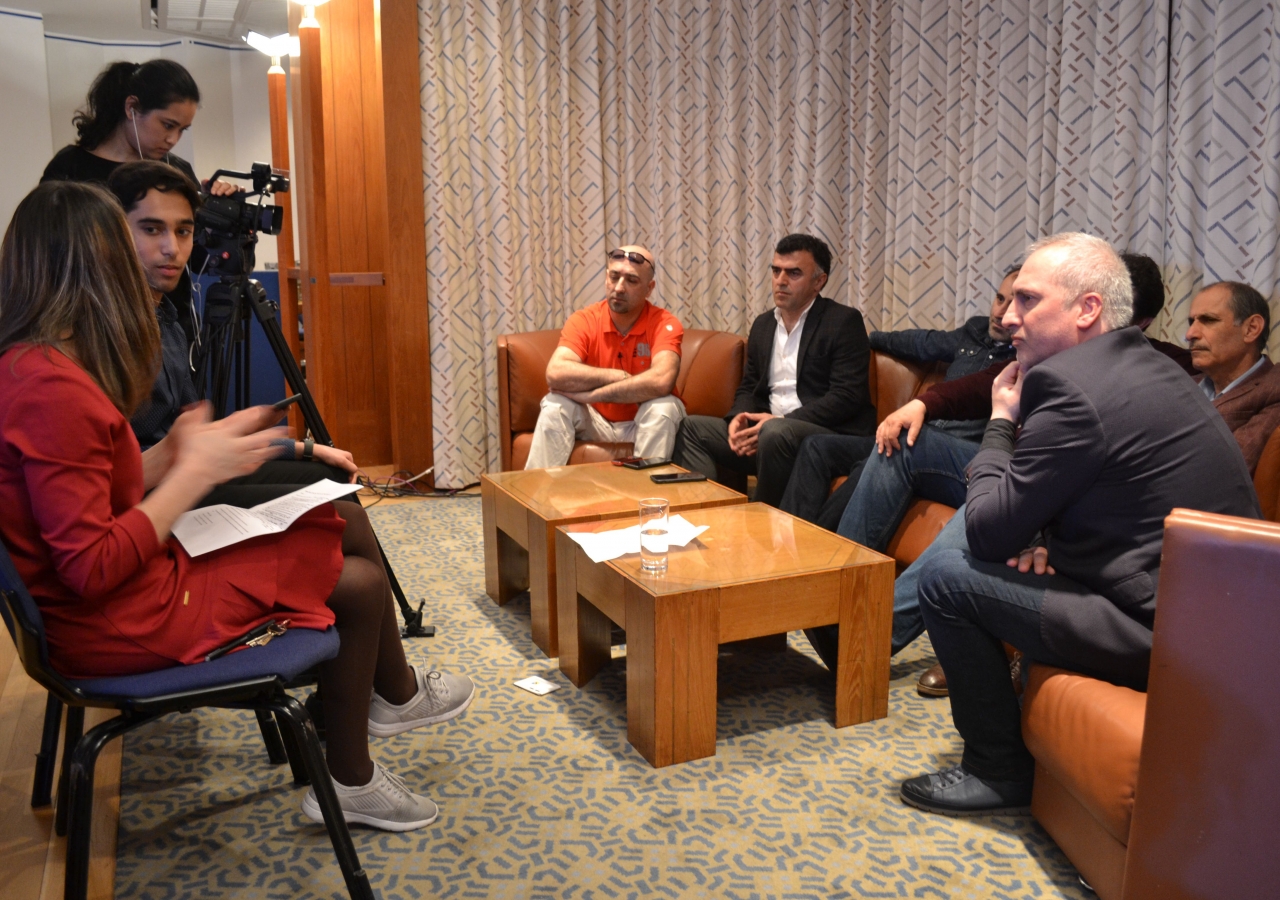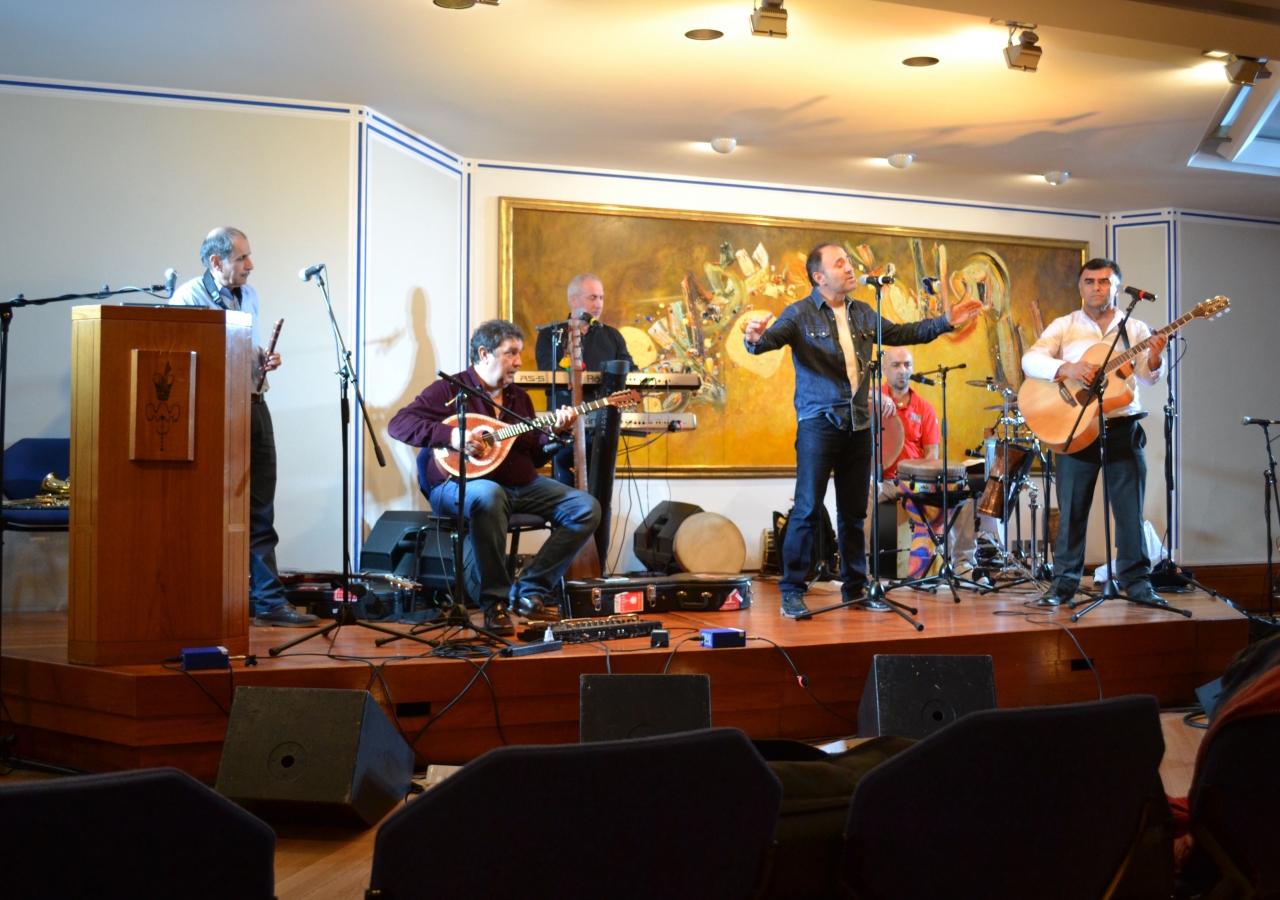At the Ismaili Centre London, we sat down for a traditional chai and chat with the Shams Group, a spectacular collaboration of musicians who have been performing in their home country of Tajikistan, and across the world, for nearly twenty years. The closely-knit group, its main vocalist, Nobovar Chanorov, and its guitarist, an esteemed master of the Pamiri Setor, Iqbol Zavkibekov, shared their profound insights and stories.
Transcript:
Q: Rahmat. Khosh-amadeed and thank you all for being here at the Ismaili Centre, London. I know that you as a group are all very passionate about music. It can be heard through the passion, and the energy, with which you perform. How did you develop your passion for music as you were growing up and through your childhood?
Nobovar: The group you see today has been formed out of passion and of course love; music came into our lives and has been a part of our childhood and growing up and we have developed it. If we didn’t have a love for music, then good music wouldn’t materialise as this was the music that was played back at home. For each of us in this group, we have had our own musical instruments; they were the ones our grandparents played and now it is our turn to play them.
Q: And I want to convey great congratulations, Mubarakbod, to all of you, for following through with your music and for excelling in your field.
All: Thank you so much.
Q: And we’ve seen the Shams Group perform at the Jubilee Games, the Jubilee Concerts, and across the world. We have always see you innovate in terms of your music and learn from new styles. What is it like fusing together the Tajik music - the traditional music - with western styles of music and new instruments?
Nobovar: We connected with the roots of our music and as a group started performing the traditional music of Tajikistan. We then went on to mix this with guitar, bass guitar, European instruments, and the genres of Rock, bits of Jazz, bits of Blues. From these modern instruments, we also listened to, and started performing Indian, Afgani and other cultures’ styles of music. We started experimenting with all these different genres and fused them together and came to the conclusion that we have to respect and come back to our roots and do something that we love and this has formed part of what we are doing at the moment.
Q: And, which artists, Western artists, or artists from other countries, have you liked listening to and learning from the most, and why?
Nobovar: It all depends on the generations we have in our group; we have members who grew up with different generations of music, like we have Iqbol, Yadidiya (Ilyaev) , and they listened to the popular music at that time, like the Rolling Stones…
Iqbol: The Beatles!
Nobovar: Yes, The Beatles… Elvis Presley, Led Zeppelin… ‘the Scorpions’, all these types of music, yes? And with the other generations, the music changed, and of course it’s still changing…
Iqbol: And part of this was the music of the Indian Traditions, like Ravi Shankar…
Nobovar: And Nusrat Fateh Ali Khan…
Iqbol: Yes, and then there were the classics of Stravinsky, and Tchaikovsky, which we learned about in Secondary School. Of course, we had to listen to them on the cassettes we had back in those days; we weren’t necessarily learning about those styles thoroughly at the time, but we were learning about them as a general subject.
Q: It’s very impressive that you are all so engaged, with the music of Ravi Shankar...
Nobovar: Along with Nusrat Fateh Ali Khan, Rahat Fateh Ali Khan, Ghulam Ali Khan…
Q (contd.): ...And then with the Western genres and instruments. I think it shows just how music does not have any borders.
Nobovar: Ah, yes! Definitely.
Q: And, you have performed with Salim-Sulaiman, and Rahat Fateh Ali Khan - who are both from the South Asian traditions of music - at the Jubilee Concerts. How did you find performing with them, and making music together?
Nobovar: Yes, with Salim-Sulaiman and Rahat Fateh Ali Khan, it was extra special, since it was for the Diamond Jubilee. Especially with Salim-Sulaiman, since we are from the same Ismaili Community, and the same global Jamat, it was actually very easy for us to work together, with songs such as ‘Ali Mawla’ being very special to us.
We listened to each other, got to know each other’s music, and now because we are living in the modern world, we don’t have to be together in the same place: we have the internet, which meant that although we were rehearsing in different countries, we could come together to make music. It happened so smoothly and with such ease because we came already knowing the history of South Asian musicians and therefore found a really great connection with them.
Q: This also ties in with the Pamiri Traditions having their roots in Spirituality, with a connection to poets and thinkers of the past, such as Rudaki, Hafez, Rumi, Nasir Khusraw. How do you feel music connects you to your faith and spirituality?
Nobovar: At its very foundation, music has a connection to spirituality.There is a special lullaby we sing called Lalayak. When toddlers take their first steps we sing Dargilak to them. Both songs are performed in Pamir languages in different dialects, in our vernacular languages. As we start attending primary school we learn Tajik language and with it, we begin to learn poetries of our classics such as Rudaki, Hafez, Rumi and many more. When someone dies we perform religious poetry Maddoh with music, which is the important devotional practice that has a special significance to that person’s life and it is performed for three days. The time we start learning about the world around us, we listen to all kind of music and our journey of learning, experimenting and performing got us all the way to England this time.
Q: And then there is the very special, cherished tradition of the Tajik and Central Asian musical instruments, where one can really appreciate their vast history and how they have developed over time.
Nobovar: Of course, we can’t tell exactly how old our instruments are, but they go back hundreds of years. Recently, we have been awarded the Aga Khan Music Award, for the work of the Gurminj Museum of Musical Instruments, in Dushanbe, the museum of Gurminj Zavkibekov - Iqbol’s father. In the museum we have different musical instruments, some of them over 100, 200, and even 300 years old.
Q: And for that, special congratulations, Mubarakbod, for such a wonderful achievement.
Iqbol: Thank you so much.
Q: And finally, do you have a message for the Young People? We know that all of you are also very young at heart!
Iqbol: So what can I say for the youth? First and foremost, they should love what they are doing. This does not only relate to music, but anything they want to develop and show to the world; they should love it. Without love and devotion they can’t achieve it.
I can give an example: the museum of my father, which won the award. Before, I didn’t understand as to why all this was happening, and now I know; the devotion he had for his work got him to that stage, and that encouraged me to continue my father’s works and here we are today to see the fruition of all these efforts.
Q: And of course, ultimately it is all about your heart, soul and faith (Dil, Jaan & Imaan).
Nobovar: Yes, definitely.
Q: Thank you, Rahmat.
All: Rahmat, Thank you so much.
Interviewer: Numair Tejani
Translator: Mukadas Muborakshoeva
Photography: Murwarid Mirzai
Video: Marjan Mirzai











